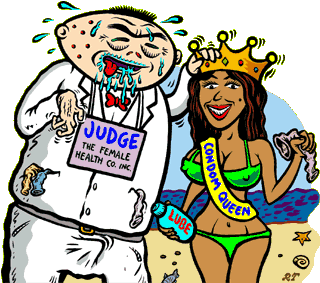
The news sounded too good to be true. The Brazilian Ministry of Health was handing out two million female condoms... for free. Even though Mardi Gras is still months away, I'm booking my ticket. Screw the no-sex-without-responsibility crowd; imagine the flare-up of recreational fornication that will be spawned by this beneficent act of socialism.
Gorgeous bronzed Brazilian goddesses, unleashed from fears of pregnancy or sexually transmitted diseases, will be putting out all over the country as a result of the Minister of Health's expressed desire to "stimulate" condom use by women. Now, all a man has to do in this South American bastion of machismo is rise to the occasion. No longer need rock star has-beens like Mick Jagger fear that some Girl from Ipanema will bear his love child.
A condom for women is definitely an idea whose time has come. According to the STD and AIDS Program Coordinator for Brazil, Pedro "Chubby" Chequer, the government's most recent order came after 2,400 women from varying cultural backgrounds inserted 100,000 female condoms as part of a pilot program directed by his agency. They liked it... repeatedly.
But what exactly are these facilitators of more personal intergender physical communication, and where do they come from? The answer draws a triangle between Africa, the United Nations, and Drew Barrymore, but first of all leads us to Wisconsin.
In 1996, Wisconsin Pharmaceutical Co., Inc. decided to manufacture the biggest-selling recreational product of all: condoms. But not those latex sheaths stashed in the wallets of pimply-faced schoolboys which, even if fortune smiled and they were used before their expiration date, could rip or cause an allergic reaction. The company changed its name to The Female Health Company, and became the sole manufacturer of the female condom.
The condom for women is made of polyurethane. A heat-sensitive plastic stronger and thinner than latex, polyurethane quickly warms to body temperature. The sheath lines the vagina entirely and contains rings at either end, with one ring lying inside at the closed end of the sheath, while the other ring remains outside the vagina. Under no circumstances should these two rings meet during intercourse, or the next ring you'll see will be the shotgun wedding band. As The Female Health Company will tell you, "There are a number of other products... which have a higher degree of accepted efficacy for preventing pregnancy."
In case you have any lingering doubts about immersing your most prized possession into a polyurethane love-canal, the company's easy-to-follow, male-oriented instructions will make you stick it out for the experience. "If you enter on the side, STOP. Guide your penis and try again. If the outer ring gets pushed inside, STOP. Add more lube. Try again. Keep practicing until you get it right. If the condom clings to your penis, add more lube to the condom ... or to your penis. For added pleasure, ask for help."
But let's fact it, condoms for women aren't just about pleasure or pregnancy, they're also about power, giving women the chance to experience their sexual desires at their whim. That's why millions of feminine condoms are being seeded throughout third-world countries by the United Nations. Since The Female Health Company owns the exclusive patent to this fine growth industry product, it also has a multi-year agreement with the Joint United Nations Program on HIV/AIDS. That organization has already distributed almost 10 million female condoms worldwide as part of AIDS prevention and reproductive health programs in the developing world.
The bad news is, FHC was also de-listed from the American Stock Exchange earlier this year for not meeting minimum financial requirements. How could this be possible? The female condom has been given to women in more than 40 countries as part of various anti-AIDS, anti-pregnancy programs. South Africa alone has ordered more than 2 million units this year, and women in the former French African colonies have been inserting them at a constantly accelerating pace. In fact, Namibia has just announced that it will introduce the feminine condom as part of its National Condom Day celebrations. Imagine being crowned the Condom Queen...
Which brings us back to Drew Barrymore, and FHC's attempt to hang on to their market in the United States. The Female Health Company proudly proclaims that one of the top 11 reasons men prefer using their condom is that Drew Barrymore, whom they gushingly describe as "one sexy lady," also uses it. That's enough to sell me. Other stars sign up for Maybelline, but Drew is the spokeswoman for The Female Health Foundation, established by The Female Health Company to help women to "better care for themselves and their families."
However, as a spokeswoman, Drew is remarkably close-lipped. A call to a company spokesperson in Chicago elicited nothing more than this curious response: "Yes, but she's been busy with her career. I know I have seen this response (sic) before. I'm not really the one to speak on it."
What caused her to clam up? Perhaps her interest simply petered out. Or perhaps she realized that the financial shortfalls that caused the delisting of The Female Health Company means less money for celebrity endorsements. Or maybe it means that with millions of condoms going to bronzed Brazilian beach bunnies, a skinny blond sex kitten might just be the runt of the litter.
Sherman Fridman is a freelance writer and novelist who views contemporary issues from a unique perspective.
